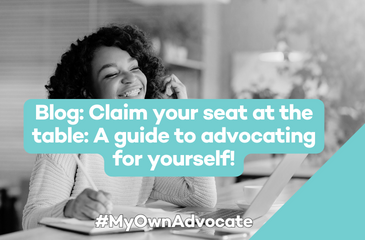When women are equipped with the tools and resources to develop their confidence and leadership skills, they can take charge of their careers and achieve great things.However, becoming equipped with those tools can be challenging.Sometimes in the workplace we are fortunate to have allies that empower, listen and provide support and resource, but this isn’t always the case. So,what does it mean to be your own advocate in the workplace, and how can more women capitalise on this to progress in their careers in the way that they want to?
Advocating for yourself means speaking up, recognising and taking credit for your achievements, and being assertive (in your own way!) about your needs and goals. It means advocating for fair treatment, equal opportunities, and recognition of your skills and accomplishments. This may all sounds intimidating, but there are small steps you can take to build your confidence and hone these behaviours.
🙌🏾 Believe in yourself
- The first step to being your own advocate is to believe in yourself. Easier said than done, right? But practice makes perfect so take time to reflect on and write down your skills, strengths, and achievements. An easy way to get started with this is to take 5 minutes at the end of each day to note down, screenshot or voice memo something you were pleased with, proud of or given great feedback about. Create a folder on your laptop or an area in your notebook where you collect these moments of positivity. You’ll be surprised how quickly achievements add up!
- If you’re having moments of self-doubt, open that folder or turn to your notes and you’ll get that small jolt of pride – consider it your personal pep talk. What’s more, don’t be afraid to showcase them! Confidence is key when advocating for yourself, so take the time to reflect on your accomplishments and use them to boost your self-esteem.
🎯 Identify your goals
- To advocate for yourself effectively, you need to have clear goals in mind. Identify what you want to achieve in your career and the steps you need to take to get there. This will help you stay focused and motivated, and it will also make it easier to communicate your needs and expectations to your colleagues and higher ups.
🗣 Develop your communication skills
- Communication is essential when advocating for yourself. You need to be able to articulate your needs, goals, and accomplishments clearly and confidently. Take the time to develop your communication skills, including public speaking, writing, and active listening. It’s a good idea to start somewhere that feels like a safe space where you can build up practice until it starts to feel more natural! This will help you communicate effectively with your colleagues, higher ups, and clients. Once you’ve got into the swing of things, you can develop your communication skills through classes, courses and stepping out of your comfort zone by take up speaking opportunities at your local Meetup groups, for example.
🔗 Build relationships
- Networking is an important part of being your own advocate as it allows you to build up a community of people, that are inside or outside of your company, that understand who you are, what you stand for and what your goals are. Through this type of authentic networking we create mutually beneficial and supportive relationships. So much of success is built on people, and the community that you create and nurture around yourself. It’s key to be vulnerable with those that you trust allowing yourself to ask for advice or support when you need it. Building strong relationships will not only help you advocate for yourself and others but will also create a support system that can help you achieve your goals.
🚀 Be proactive
- Finally, being your own advocate requires proactivity. Take the initiative to seek out opportunities for growth and development, and don’t be afraid to ask for feedback or constructive criticism. Maybe even put some time aside each week to invest in your own progression and advocacy. You could use that time to apply for speaking slots, research training or build new connections. Proactivity demonstrates your commitment to your career and shows that you are willing to take ownership of your professional development.
✍️ Why you should be your own advocate
- Being your own advocate in the workplace is a huge step towards achieving success and satisfaction in your career. Starting with ourselves, allows others to believe in our abilities and confidence. It requires self-awareness, clear goals, effective communication, strong relationships, and proactivity.
If you’re interested in taking these steps with the support of a community and award winning coaches, why not enquire about our next Confidence Collective programme today. We encourage women from all backgrounds and industries to take that step!

